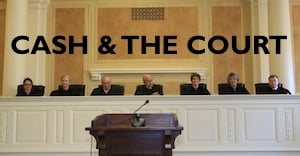Seventeen state judges, attorneys and law professors will study whether Arkansas should change the way it selects judges and examine ways to dampen the influence of "dark money" attack ads that have targeted candidates in Arkansas Supreme Court campaigns since 2014, the Arkansas Bar Association president said Thursday.
Arkansas Bar Association President Eddie Walker of Fort Smith said the group also will look at setting stricter rules for disqualifying judges from cases involving their campaign donors.
The group is expected to make its recommendations to the bar association's governing group before a June 18 meeting.
If the bar association decides changes are needed, the state's largest legal organization will work with the General Assembly to draft legislation, Walker said.
"We've never had trouble finding a sponsor" for bar association legislation, Walker said.
Judicial ethics issues have become widely discussed topics among lawyers and the public, Walker said.
Out-of-state "dark money" groups backed by unidentified donors poured at least $800,000 into television advertising attacking Supreme Court Associate Justice Courtney Goodson and Little Rock attorney Clark Mason in their March 1 contests, according to federal records. Both candidates lost their races -- Goodson for chief justice and Mason for associate justice.
Walker cited the Arkansas Democrat-Gazette's "Cash & The Court" series as another catalyst. The January series reported that six law firms that work together on class-action civil cases in the state were among the biggest campaign donors to the six elected justices currently on the Arkansas Supreme Court.
The high court has heard cases involving the law firms and decided in their favor, court records show. The decisions resulted in millions of dollars in attorneys' fees for the firms.
The law firms included Keil & Goodson of Texarkana and six firms from Texas, Oklahoma and Pennsylvania. John Goodson, a partner at Keil & Goodson, is married to Associate Justice Courtney Goodson. The law firms contributed an estimated $296,000 total to the campaigns of Associate Justices Goodson, Karen Baker, Robin Wynne, Paul Danielson, Josephine Hart and Rhonda Wood.
The Arkansas Judiciary was hit with scandal in January 2015 when former Circuit Court Judge Michael Maggio of Conway pleaded guilty to federal bribery charges. He admitted lowering a jury award from $5.2 million to $1 million in a nursing home abuse case after receiving campaign contributions from the nursing home owner. Maggio has yet to be sentenced.
Gov. Asa Hutchinson, who said last week he wants to end elections for Arkansas appeals court judges, is represented on the new bar association task force by his general counsel, Justin Tate, according to a statement by a Hutchinson spokesman.
"I have also been discussing possible reform efforts with legislators," Hutchinson said in the statement.
State Rep. Matthew Shepherd, R-El Dorado, was another appointee to the bar association's new study group, which is titled Task Force on Maintaining a Fair and Impartial Judiciary. Shepherd has introduced legislation in the past to appoint judges, rather than elect them as the state does now.
In appointing task force members, Walker said he looked for geographic diversity but not anyone's opinions on judicial selection and related issues.
"The thing most important to me is to have people who have good judgment and enough experience to weigh the facts," Walker said.
Other task force members include chairman Jon Comstock, a mediator and former Wal-Mart Stores Inc. in-house legal counsel; Circuit Judges David Guthrie of El Dorado and Mary McGowan of Little Rock; University of Arkansas at Little Rock law school Associate Dean Theresa Beiner; University of Arkansas at Fayetteville professor of law Mark Killenbeck; and attorneys Robert Cearley of Little Rock; Bob Estes of Fayetteville; Scott Hardin of Fayetteville, who is a general counsel associate with Wal-Mart; Paul Keith of Monticello; Marie-Bernarde Miller of Little Rock; Brant Perkins of Jonesboro; Troy Price of Little Rock; Brian Ratcliff of El Dorado; Guy Wade of Little Rock; and David H. Williams of Little Rock.
Arkansas is among three or four states looking closely at judicial selection and the influence of "dark money" on judicial campaigns, said Debra Ehrenberg, director of state affairs for Justice at Stake, a nonpartisan Washington, D.C., group that studies the judiciary and advocates appointing judges rather than electing them.
Illinois, Ohio and Pennsylvania also are "beginning to have the conversation" or moving talk about judicial selection "to a higher level," Ehrenberg said Thursday.
Arkansas is "a little bit past starting the conversation," she said. "There seems to be a broader recognition and concern about the problems related to all the money and the special interests that have found their way into Arkansas elections.
"The public awareness about the issue is much higher than in a lot of places," Ehrenberg continued. "It's more about the details of 'what we're going to do about this' rather than "do we have a problem here."
Retired Arkansas Supreme Court Justice Robert Brown, who has long advocated judicial elections, said Thursday he now believes judges should disclose all campaign contributions to parties that appear before them in court.
"I'm glad they're doing it," Brown said of the bar association's task force members and their study. "I think it's ambitious."
Metro on 03/11/2016

- MAIN MENU
- PART I: 6 law firms top donations list
- PART II: Top donors net big wins
- PART III: Campaign money stirs debate over how judges picked
- State justices respond to donation questions
- After 2010 high court race, justice wed a top donor
- Firms file suits, donate together
- INTERACTIVE: Breakdown of campaign contributions to justice candidates
- GRAPHIC: Class-action contributions to justices
- How we did it